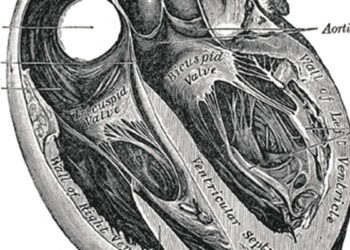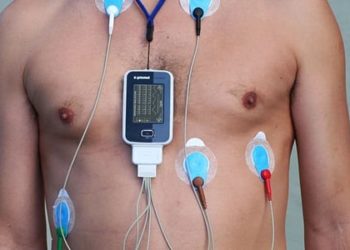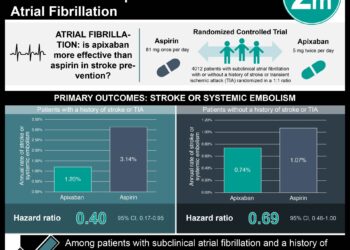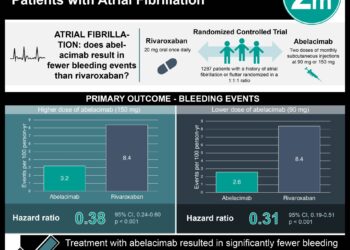The ACTIVE trial: Dual antiplatelet therapy in atrial fibrillation [Classics Series]
1. In patients with atrial fibrillation who require anticoagulation but cannot tolerate warfarin, dual anti-platelet therapy may be a potential alternative for stroke prophylaxis.
2. Clopidogrel, in addition to daily aspirin, significantly reduced the incidence of stroke, but increased the incidence of major bleeding in patients with atrial fibrillation when compared to treatment with aspirin alone.
Original Date of Publication: May 14, 2009
Study Rundown: Atrial fibrillation is a common arrhythmia characterized by uncoordinated contractions of the atria, thereby resulting in blood stasis and increased risk of thromboembolic disease. The CHADS2 score is a commonly used score to estimate a patient’s annualized risk of stroke by assessing age and comorbidities. Stroke prophylaxis with antiplatelets or anticoagulants is generally recommended with a CHADS2 score of 1 or more. While vitamin K antagonists, like warfarin, remain the most commonly used anticoagulants for stroke prophylaxis in atrial fibrillation, they are not suitable for many patients due to drug interactions, elevated risk of intracranial bleeds, and monitoring requirements, amongst other reasons.
Originally published in 2009, the purpose of the Atrial Fibrillation Clopidogrel Trial with Irbesartan for Prevention of Vascular Events (ACTIVE) trial was to explore whether adding clopidogrel to aspirin for stroke prophylaxis would be more effective than aspirin alone, in patients who were considered unsuitable for warfarin. In summary, the findings suggest that the addition of clopidogrel does significantly reduce the risk of stroke (RR 0.72; 95%CI 0.62-0.83), but also significantly increases the risk of major bleeding (RR 1.57; 95%CI 1.29-1.92).
Click to read the study in NEJM
In-Depth [randomized, controlled study]: The study involved 7,554 participants from 580 centres in 33 countries. Patients were eligible for the trial if they had atrial fibrillation at enrolment or ≥2 episodes of intermittent atrial fibrillation in the past 6 months, and at least 1 risk factor for stroke (e.g., ≥75 years, hypertension, previous stroke, left ventricular ejection fraction <45%). Patients were excluded if they required a vitamin K antagonist or clopidogrel, or if they had risk factors for haemorrhage (e.g., peptic ulcer disease in past 6 months, previous intracerebral haemorrhage, significant thrombocytopenia, alcohol abuse). Participants were randomly assigned to receive either clopidogrel 75 mg daily or a matching placebo. All participants were also prescribed 75-100 mg of aspirin daily. Follow-up occurred over a median of 3.6 years. The primary outcome was a composite measure comprised of strokes, myocardial infarctions, non-central nervous system systemic embolism, or death from vascular causes.
Patients in the clopidogrel group experienced significantly lower risk of the primary outcome compared to patients taking aspirin alone (RR 0.89; 95%CI 0.81-0.98). This difference was driven by a significant reduction in the risk of stroke (RR 0.72; 95%CI 0.62-0.83). Compared to those receiving aspirin alone, the rates of major bleeding were significantly higher in the group receiving clopidogrel (RR 1.57; 95%CI 1.29-1.92), occurring most commonly in the gastrointestinal tract.
Image: PD
©2012-2014 2minutemedicine.com. All rights reserved. No works may be reproduced without expressed written consent from 2minutemedicine.com. Disclaimer: We present factual information directly from peer reviewed medical journals. No post should be construed as medical advice and is not intended as such by the authors, editors, staff or by 2minutemedicine.com. PLEASE SEE A HEALTHCARE PROVIDER IN YOUR AREA IF YOU SEEK MEDICAL ADVICE OF ANY SORT.




